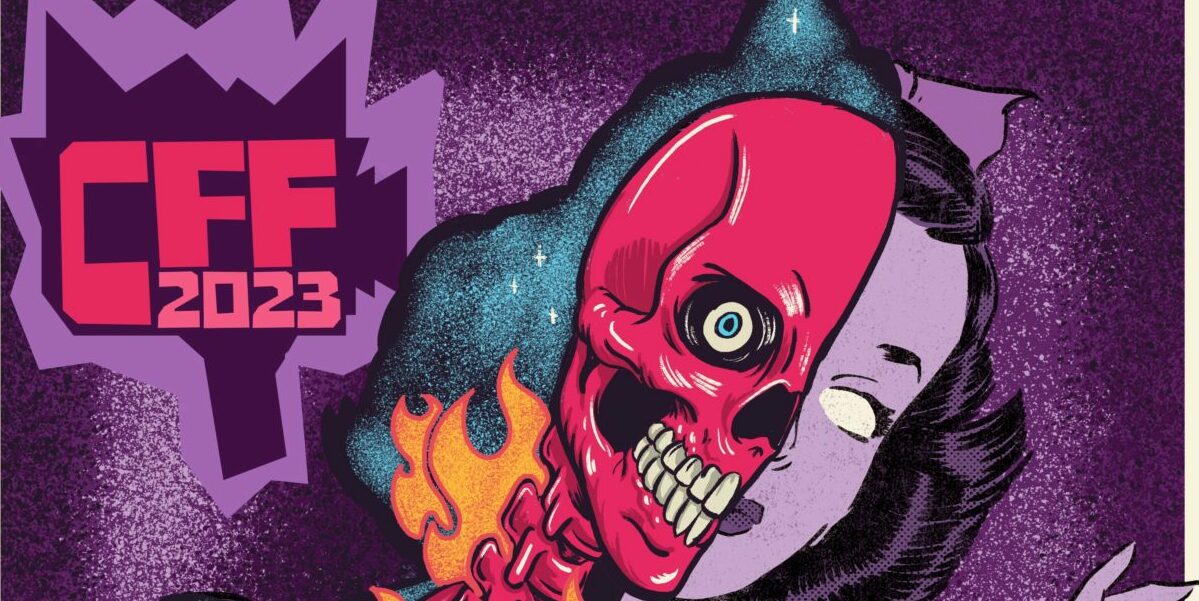

A bunch of teenagers looking for a spot to party. An empty cabin with a bloody history. A masked killer picking them off one by one. Sound familiar? Of course it does. I could be describing any number of films from the past 45 years or so. But what sets Jonas Trukanas’ We Might Hurt Each Other apart from the slasher films of yore is a series of simple decisions that ultimately put this film a step or two above its predecessors.
We Might Hurt Each Other (retitled from its original English title Pensive) starts out with a premise that we’ll just call “well trod”: a group of teenagers, looking for a place to party and celebrate their recent graduation. Amongst them is Marius, a bland middle of the road type with no real direction for his academic future. It’s clear that while he’s not exactly the prom king, he seems to be well liked by his circle of peers. Desperate to win the affection of a girl he has a crush on, Marius saves the day when the party’s original location falls through by suggesting a cabin his mother (a real estate agent) has on the market. They arrive at the cabin and soon discover a series of eerie wooden statues on the property. And, like teenagers are wont to do, they turn the statues into firewood or destroy them in some other way. Soon, a masked juggernaut of a killer is hunting them down one by one, and Marius must find a way to figure out what’s going on and escape the killers’ clutches. As I said, this is all familiar territory. Alas, what makes this film so interesting is that Marius is no Ash Williams, an everyman who rises to the occasion against some unspeakable ancient evil. He’s no Stretch Brock going toe to toe with a cackling Bill Moseley. He’s not even what’s his face from the first Terminator film going toe to toe with the T-800 while his girlfriend is making a sandwich in the next room. Instead, Marius is what you could graciously call a mewling piece of shit who is obsessed with impressing a girl who he thinks he has a connection with but in reality, can’t stand him and finds him to be “the most boring person in the world.”
It’s a bold move making your protagonist in such a film so utterly unlikeable, but it pays off. It truly makes you root for the killer to find him and pull his dumb fucking head off. Again, Marius isn’t some kind of weird outcast; he’s just pissy that he’s not as well liked as his best friend Rimas. By all appearances most people like him just fine but no that’s not good enough for this entitled little asshole. It’s a perfect summation of the toxic masculinity so prevalent in society today: I’m a nice guy so women should like me, even if it means hurting someone who cares about me. Another brilliant layer to Turkan’s’ film: Marius is super boring. He’s not fun at all. He doesn’t even do the cool kid thing and wreck the sculptures with the rest of his friends. He just a fun hating sponge moping around because a girl doesn’t like him. He is, quite literally, too boring to kill. What’s more infuriating is that this entire horrific train of events is his fault. He only suggested this cabin because he thought it would win this girls heart but instead it gets his friends killed. It would be funny if this world wasn’t packed to the gills with dickheads just like him.

Actor Sarunas Rapolas Meliesius does quite the job at bringing Marius to life and showing that he is ultimately an irredeemable character. He imbues Marius with a sullen, pouting, infuriating rage, like a toddler realizing he can’t have his way. There is no growth for his kind, no discovering of inner moral fiber at the last minute. Ultimately Marius may not have much of an inner anything. Trukanas presents us with a weaselly sulking teenager too self-obsessed to have fun. Marius is simply too shallow to realize he is owed nothing by women, no matter how much of a “nice guy” he thinks himself to be. He is, in fact, the archetypical “nice guy” persona distilled into a pathetic avatar, a sniveling child wallowing in self-pity and furious that his transparent acts of kindness were seen for exactly what they were instead of getting him what he wanted: the female attention he’s convinced he’s owed.
Asshole protagonist aside, this is a blast of a movie. Even without the “Final Girl” character to root for, there are still plenty of sequences that will satisfy horror fans. The lore behind the cabin is simple but effective, the kills aren’t too over the top but at still a blast to watch play out. The film has a hilariously realistic depiction of how teenagers would handle this situation in real life, and even though the killer is ultimately a Jason Voorhees analog it still works. It has a bittersweet veneer to it that is tenderly relatable, harkening back to that knifes edge moment between childhood and adulthood when everything is about to change, and everything is uncertain. It’s a fantastic summertime movie and packed with archetypical characters I’m sure the audience will be able to relate to.

Don’t let the simple premise fool you: Trukanas has absolutely crafted a brilliantly scathing commentary on toxic masculinity with this film. It might seem impossible to have a slasher without any sort of hero but trust me it is incredibly satisfying to see this absolute dork get dunked on by his peers for carrying on like an asshole while they’re all being stalked by a killer. And I think maybe that’s the most relatable thing about this film: the collective verbal swirly of some nerd who thinks he’s better than everyone else but is convinced no one’s realized it yet.




